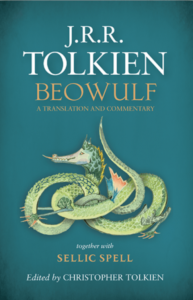Beowulf and UKIP
Two events of the last couple of days have arrested my attention: the much hyped launch of J.R.R. Tolkien’s translation of Beowulf and the astonishing electoral success of the anti-EU British political party, UKIP.
What do these two events have in common? From the more or less (mainly less) interesting media pundits I’ve been reading, nothing at all. But a better awareness regarding the first might have helped stem the tide of the second.
 Let’s agree that some (certainly not all) of the UKIP electoral success arises from a smoldering English nationalism. Well, Tolkien was a great English nationalist; one of the greatest. His fantasy writing was bound up with his desire to rediscover (read: create) a lost English mythology. But a moment’s reflection upon the content of Tolkien’s English nationalism reveals it as inextricably bound up with Continental myths, legends, and history. Middle-earth is not ancient England, it is ancient Europe; the Shire is not even separated from the Continent by a salt-water channel.
Let’s agree that some (certainly not all) of the UKIP electoral success arises from a smoldering English nationalism. Well, Tolkien was a great English nationalist; one of the greatest. His fantasy writing was bound up with his desire to rediscover (read: create) a lost English mythology. But a moment’s reflection upon the content of Tolkien’s English nationalism reveals it as inextricably bound up with Continental myths, legends, and history. Middle-earth is not ancient England, it is ancient Europe; the Shire is not even separated from the Continent by a salt-water channel.
Beowulf illustrates this perfectly. This English epic, the most splendid poem composed in Old English, concerns a monster named Grendel who terrorizes the King of Denmark. The hero Beowulf is a Geat, who sails to the aid of the Danes from his home in what is now southern Sweden.
Tolkien’s own stories weave together distinct parts of an English mythology that, he wanted to believe, were once told by the ancient ancestors of the English nation who inhabited the shores around the North Sea and the Baltic. Tolkien’s English mythology is a Continental mythology.
Today, very few study these Old English stories from Tolkien’s perspective. In most scholarly circles English nationalism is a dead letter; and few self-respecting scholars of English literature are going to give it a sympathetic treatment.
But English nationalism is alive and kicking in the wider world of good old England; as the recent electoral results make only too clear.
If today’s young Tolkien experts were a little less concerned with what is politically correct and a little more concerned with the wider world beyond their (very) narrow specialisms, discussion of Tolkien’s Beowulf might have spoken to the public at large. In place of wide-eyed media hype we might have heard how pride in an English identity can embrace – rather than fear and loathe – the idea of belonging to Continental Europe.




